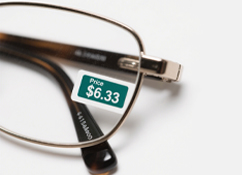Summer’s scorching heat doesn’t just make you sweat—it can permanently damage your sunglasses, prescription glasses, or reading glasses. If you’ve ever left a pair in a hot car or on a sunlit windowsill, you might have noticed foggy lenses, peeling coatings, or warped frames. The good news? With a few simple steps, you can keep your glasses safe all season long. Let’s start with the most critical rule:
Never leave your glasses in a hot car. Never leave your glasses in a hot car. Never leave your glasses in a hot car.

Repeat it three times—because this single mistake is the #1 cause of summer glass damage.
This rule applies to all glasses: sunglasses (polarized, mirrored, or fashion), prescription lenses, reading glasses, even blue light blockers. Here’s why heat is so dangerous:
- Plastic lenses melt or warp: Most lenses are made of plastic (polycarbonate or CR - 39). At just 122°F (50°C), anti - reflective, polarized, or photochromic coatings can bubble, peel, or crack. At 158°F (70°C)—the temperature inside a closed car on a 90°F (32°C) day—lenses can melt completely.
- Frames bend or break: Plastic frames soften in heat, so they’ll warp if left on a hot dashboard. Metal frames can corrode from sweat or humidity, making hinges loose or temples bent.
- Reading glasses are fire risks: Convex reading lenses focus sunlight like a magnifying glass. If left on a car seat or dash, they can concentrate heat enough to start a fire—yes, really.
And one more tip: Skip saunas, steam rooms, and hot tubs with your glasses. The combination of heat and moisture destroys lens coatings faster than anything else.
The biggest summer hazard is your car—never leave glasses inside, even for “just a minute.” On a sunny day, temperatures skyrocket in seconds:
- A 90°F (32°C) day → 158°F (70°C) in a closed car in 60 minutes.
- A shaded parking spot → 122°F (50°C) on the dashboard in 5 minutes.
If you must leave glasses behind, put them in a cool, dark spot (like a glove box with a towel) or take them with you. At home or work? Don’t leave glasses on windowsills, kitchen counters, or near heaters—heat causes permanent damage.
Sweat is a frame’s worst enemy. The salt and oil in your sweat can:
- Corrode metal frames (leaving green or brown spots).
- Discolor plastic temples or make them sticky.
- Break down nose pads (making them hard or uncomfortable).
- Cause skin irritation (for sensitive users).
After wiping your face, use a soft microfiber cloth to dry your frames—focus on the temples and nose pads. For extra cleaning, use a mild soap and warm water (no harsh chemicals!) to remove built - up sweat.
Summer means trips to the beach, park, or pool—and your glasses go everywhere with you. But tossing them in your bag without a case is a mistake:
- Coated lenses (polarized, anti - glare) scratch easily—even a tiny scratch distorts vision.
- Plastic frames can bend if crushed by a water bottle or sunscreen tube.
- Sand or dirt in your bag can grind into lenses, making them cloudy.
Use a hard case for sunglasses (to protect against drops) or a padded pouch for prescription glasses. When you’re not wearing them, put them in the case—every time.
If you wear photochromic (light - adjusting) lenses, heat can ruin their effectiveness. Leaving them in direct sun for hours makes the tint slower to darken or lighten. Keep them in a case when not in use, and avoid leaving them on your forehead or hat (yes, that’s still direct sun!).
Pulling glasses off with one hand bends the temples or loosens hinges. Use both hands: Hold the temples (side arms) and lift straight up, with lenses facing out. It takes 2 extra seconds and keeps frames aligned.
When you’re not wearing glasses, wrap them in a microfiber cloth and put them in their case. Don’t set them on tabletops, couches, or beds—someone could sit on them or knock them off. Window sills are a no - go (sun + heat = damage).
Dust, oil, or makeup on lenses? Use mild dish soap and warm water—rub gently with your fingers, then pat dry with a soft cloth. Paper towels, tissues, or shirt sleeves are too rough—they’ll scratch lenses.
If your frames are twisted, loose, or drooping, they’ll feel uncomfortable and won’t sit right on your face. Don’t try to bend them back yourself—visit an optician. They’ll adjust hinges, tighten screws, or straighten frames without breaking them.
If your lenses are cracked, coatings are peeling, or frames are warped beyond repair, it’s time for a new pair. Damaged glasses don’t just look bad—they can distort your vision or cause eye strain.
Your sunglasses and prescription glasses are investments—treat them like it. Follow these tips, and you’ll keep them clear, comfortable, and in shape all summer long.











